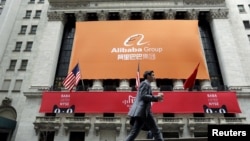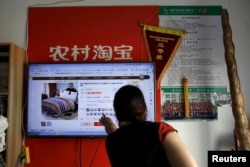Chinese e-commerce giant Alibaba, which has posted stellar financial performances year after year, is suddenly going through stormy times, with two different investigations launched against its operations in the United States.
Alibaba, known as the closest rival to Amazon and listed on the New York Stock Exchange, is under the microscope of the U.S. Securities and Exchange Commission, as well as the International Anti-Counterfeiting Coalition.
After Alibaba disclosed the SEC investigation of its accounting practices and sales data last week, nervous investors sent share prices tumbling. The Washington-based IACC, an industry-driven group, recently expelled Alibaba just one month after the Chinese firm had been admitted as a member and described by IACC as "one of our strongest partners."
The company, named after the famous Arabian tale, "Ali Baba and the 40 Thieves," now will have to convince IACC it did not deliberately allow or condone sales of counterfeit goods to boost its revenues and profits. Alibaba's online platforms Taobao and Tmall are widely seen as sources of fake or falsely branded goods, but analysts say it is unclear whether this was the company's deliberate policy.
"Alibaba’s Taobao site is notoriously well known for selling counterfeit goods," said Jeongwen Chiang, professor of marketing at the China Europe International Business School. "They claim they have been trying to clean up those merchants but the problem continues."
After the IACC action, Alibaba said it closed down 5,000 stores and removed 180,000 sales listings for counterfeit goods from Taobao, its online shopping platform, in cooperation with product makers and the industry group, which strives to combat counterfeiting and piracy through self-regulation.
100% commitment
"We are 100 percent committed to fighting this battle," Michael Evans, president of Alibaba Group Holdings, said at a recent IACC event in Florida. Counterfeiting is a "massive and pervasive industry issue," he said. "It happens on our platforms and on every other e-commerce platform globally. It is happening everywhere around the world, not just in China."
There are some who think that Jack Ma, head of Alibaba, has done what he can to stop counterfeiting. The 17-year-old company's shopping platforms attracted 423 million shoppers looking at over a billion listings last year. Supporters of the $15.7-billion company say it is nearly impossible to police hundreds of millions of daily transactions.
"Jack Ma is not so stupid as to condone fakes," said Ernie Diaz, consultant and publisher of China Digital Review.
"Selling fakes is not in the interest of Alibaba or the Chinese e-commerce industry in general, and Ma knows it," Diaz told VOA. "It would take upwards of a million people to check hundreds of millions of transactions that take place each day, and this is not viable."
Alibaba's various online platforms account for about one-third of all e-commerce transactions in China. They were worth about $1.4 trillion in 2015.
Amazon vs. Alibaba
Amazon and other e-commerce giants have not been accused of selling counterfeit goods, for the most part, because they filter the process of product listings, displays and authentication more efficiently, analysts say. The Chinese government, which is keen to encourage online sales, may have been lenient in dealing with Alibaba and other local companies, some analysts add.
CEIBS professor Chiang said the Chinese government and IACC both should work with Alibaba to clean up the online shopping mess.
"It is in the best interest of all Chinese e-commerce companies to erase the tainted image currently prevalent in the U.S. and the rest of the world," Chiang said. "They should work closely with the Chinese government, not only to track and shut down those merchants who sell and produce counterfeit products, but to prosecute and penalize them."
Another CEIBS professor, Oliver Rui, said he expects Alibaba's share price to decline further on the NYSE, but he does not expect the SEC to impose serious restrictions on the company's financial operations.
Difficult times at home, too
Adverse headwinds also seem to have hit the Chinese company at home. Alibaba has ordered its online stores to stop selling medicine, acting on orders from the Hebei province branch of China's Food and Drug Administration.
Market sources say this will cut into the company's profits, because Alibaba's online platforms sold bulk drugs to thousands of retailers and pharmacies across China.
The Chinese government's decision to limit online drug sales followed a recent controversy about the death of an young cancer patient, and may not have any effect on the investigations in the U.S. But it has come at an inopportune time, when Alibaba is trying to reassure its customers and investors that its management practices are sound.






